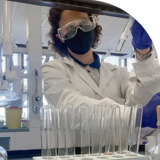The Faculty of Arts and Philosophy, together with the Faculty of Education, participates with its own teaching, organisational and research resources in the implementation of this graduate programme.
Objectives
The following competences, knowledge and skills are specific training objectives of the graduate programme in Philosophy, which belongs to the LM 78 class: l graduates will be guided both to the acquisition of a thorough knowledge of the historical development of philosophical thought and to the theoretical investigation of specific ethical, anthropological and bioethical, epistemological and metaphysical issues. The training of the students will take place within the framework of differentiated curricula and will be concluded with specific research of a highly scientific nature; l graduates will beable to use fluently, in addition to Italian, written and spoken English (compulsory) and French or German (optional), with reference also to subject-specific terminology; l graduates will also possess those computer and telematic skills that today make it easier to conduct scientific research, also in the humanities; l graduates will be able to benefit from organic philosophical training for access to subsequent levels of training for qualification in secondary education or professional areas of communication and human resources training and management.
Programme Structure
The programme refers to three basic areas of research and training. These areas, based on the revival of the classical and meta-physical tradition and its critical update in the contemporary world, are: the historical-philosophical area, the ethical-bioethical-anthropological area, the theoretical-logical-epistemological ar
Historical-Philosophical Area
In the historical-philosophical area, the aim is to provide students with a thorough grounding in the methodological and theoretical tools of philosophical studies, as well as an adequate knowledge of the historical development of philosophical thought. The essential and foundational problems of philosophy will be addressed through a careful and critical study of the authors of the Western metaphysical tradition and contemporary philosophical debate. The reference to the texts will therefore be considered essential and should be conducted with philological and critical awareness.
Ethical-Bioethical-Anthropological Area
In the Theoretical-logical-epistemological field, the aim is to acquire conceptual and methodological tools useful for developing critical and in-depth skills in the fields of theoretical philosophy, logic, philosophy of science (formal, natural and human), ontology and its metaphysical implications; in particular, the aim is to deepen the theoretical reflection from the classical metaphysical tradition (ancient, medieval, modern), up to the contemporary expressions of the philosophy of existence and the most recent analytical ontology.
Theoretical-Logical-Epistemological Area
In the Theoretical-logical-epistemological field, the aim is to acquire conceptual and methodological tools useful for the development of critical and in-depth skills in the fields of theoretical philosophy, logic, philosophy of sciences (formal, natural and human), ontology and its metaphysical implications; in particular, the aim is to deepen the theoretical reflection starting from the classical metaphysical tradition (ancient, medieval, modern), up to the contemporary expressions of the philosophy of existence and the most recent analytical ontology.





